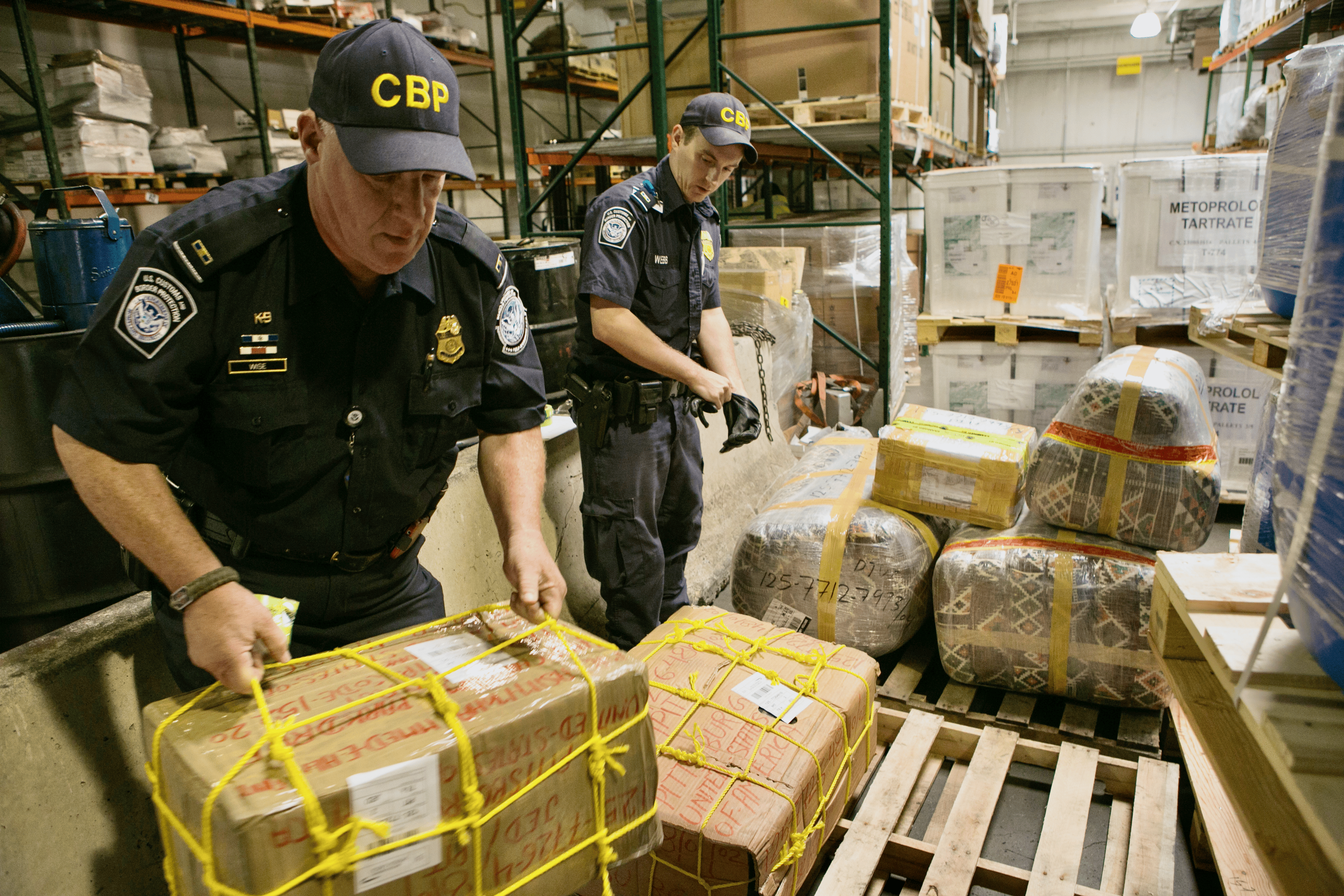
A disassembled helicopter, shipped from Colombia piece by piece. More than 30,000 parcels addressed to fictitious characters — including at least 800 to Disney personas. These are just some of the red-flagged imports customs officials have intercepted this year, all of which entered the U.S. via a trade loophole heavily used by Chinese e-commerce firms.
More than four million packages currently enter the U.S. every day on average through the de minimis exemption, which allows those worth less than $800 to be imported tax free, and with little reporting on their contents. That’s more than double the volume compared to 2022, driven in large part by the roaring success of platforms like Shein and Temu which specialize in shipping cheap goods directly from Chinese warehouses to consumers’ doorsteps.
Now, a crackdown is underway. Alarm in Washington that the loophole has become an artery for merchants to dodge tariffs and smuggle illicit goods prompted U.S. Customs and Border Protection (CBP) to tighten enforcement in April. At least five bills have been introduced in Congress that would raise reporting requirements for small packages and dam the flow of certain Chinese imports.

Yet policy makers and customs officials are swimming against the current, as more companies embrace, rather than shirk away from, the trade exemption. Amazon, for example, is now preparing to offer discounted goods shipped directly to consumers from warehouses in China for the first time, according to reporting by The Information this week, citing slides shown to Chinese sellers.
In response to The Wire, Amazon did not confirm the story but said it was “always exploring new ways to work with our selling customers.”
Meanwhile, some in the industry say that shining a spotlight on de minimis imports has had the unintended effect of raising interest in using the exemption, with more companies warehousing their goods in neighboring Mexico and Canada.

At stake is the U.S.’s ability to stand up to China on a range of priorities, from unfair trade practices to human rights. Many policymakers see narrowing the loophole as vital to America’s efforts to enforce tariffs against Chinese industry, keep out goods made with forced labor and stop the trafficking of fentanyl.
“I do think [the crackdown] will have an impact,” says Cindy DeLeon, managing director of DeLeon Trade, a trade consultancy, and a former CBP customs auditor. “Will it be enough? Probably not. Criminals are creative and will always find a way through. But CBP needs to ensure the integrity of trade data, and to find parties to hold accountable.”
One of the main targets for U.S. officials cracking down on de minimis abuse is customs brokers, domestically-based intermediaries that help to expedite the import process for small packages. Several government pilot programs grant accredited brokers ways to fast track imports through customs, in exchange for their help in providing additional scrutiny over the packages they oversee.
More than three quarters of the one billion small packages that entered the U.S. last year went through such programs, helping CBP and the trade community to save approximately $3 billion in costs, according to the agency’s own estimate.
Criminals are creative and will always find a way through. But CBP needs to ensure the integrity of trade data, and to find parties to hold accountable.
Cindy DeLeon, managing director of DeLeon Trade, a trade consultancy, and a former CBP customs auditor
But U.S. officials say that shoddy reporting and lax enforcement by the brokers has left the system open to exploitation, and made it harder to know what is entering the country and where it’s going.
“A lot of brokers are just taking whatever information is provided to them and forwarding it onto customs,” says DeLeon. The brokers’ narrow profit margins combined with the enormous volume of deliveries they handle make it difficult for them to devote resources to scrutinizing shipments, she adds.
Advocates in the trade community say that the result is the U.S. is losing intelligence about the country’s trading behavior, to the detriment of domestic companies.
“Imports of textiles and apparel from China look like they’re declining. But those goods are still coming into the market [through the exemption], just from Mexico or Canada,” says Nicole Bivens Collinson, a lobbyist at Sandler, Travis and Rosenberg, a Washington D.C. law firm, who represents apparel brands. CBP’s inability to track that data, she says, “makes it harder for businesses to substantiate trade remedy cases, and for the government to allocate funding to the right enforcement priorities.”
Further complicating Washington’s efforts is that heightened attention on the de minimis loophole has expanded its usage by U.S. companies.
In cities such as Tijuana, Mexico, and Mississauga, Canada, a growing ecosystem is helping companies take advantage of the exemption by providing warehouse space and logistics support for them to ship goods that may have originally come from China to U.S. customers from just across the border.
In March, for example, global container shipping giant Maersk opened a 30,000 square meter facility in Tijuana, advertising the site as a fulfillment center for de minimis shipments.

Kevin Sides, co-founder of ShipMonk, a Fort Lauderdale-headquartered logistics company, says the Trump administration’s trade war with China initially catalyzed his firm’s entry into the de minimis business.
“We didn’t enter it for a long time because we thought it was just a loophole that was going to go away,” he says “Then, [after the Trump administration slapped tariffs on a slew of Chinese products] we lost a client because they really needed those services.”
ShipMonk opened its first warehouse in Tijuana in 2021, from which customers can ship their product directly to U.S. customers, exempted from tariffs and customs duties. Since then, it has added two more buildings as demand for its services has grown, which Sides attributes to growing awareness about the exemption.
As recently as two years ago, he says, “there were huge, Fortune 1000 companies who’d never heard of [de minimis]. Other companies are realizing now it’s not a shady loophole, and are comfortable enough now to say ‘let’s try it and compare the savings.”
Efforts to reverse the ballooning volume of de minimis imports may require more sweeping changes from Congress. Several proposed bills would make it more difficult for Chinese goods to benefit from the exemption. One bill, which has the support of Jason Smith, chair of the powerful House Ways and Means Committee, would block goods subject to protectionist U.S. tariffs from being eligible for the trade exemption and fine violators up to $10,000 per offense. The Trump administration first imposed tariffs on Chinese goods in 2018, and the Biden administration expanded the list of targeted products in May.
One product on that list is Chinese textile and apparel imports. Blocking them from de minimis would inflict significant damage on Chinese fast fashion companies like Shein.
“I put the chance of something happening [in Congress] in 2024 at 60 percent,” says Collinson. “There’s a lot of momentum towards trying to do something right now.”

Eliot Chen is a Toronto-based staff writer at The Wire. Previously, he was a researcher at the Center for Strategic and International Studies’ Human Rights Initiative and MacroPolo. @eliotcxchen




